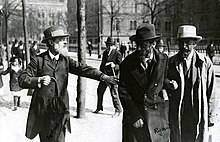Pavel Borissowitsch Axelrod

Pawel Borissowitsch Axelrod ( Russian Павел Борисович Аксельрод ; born August 25, 1850 in Potschep , Chernigov Governorate as Boruch Pinchus , Russian Борух Пинхус ; † April 16, 1928 in Berlin ) was a Russian socialist .
Life
Pawel Axelrod was born as the son of a Jewish landlord in the town of Pochep in what is now the Bryansk Oblast (Russia). He studied at the school in Mogilev and at the lyceum in Nischyn . In 1872 he moved to Kiev University and, influenced by Mikhail Bakunin's writings, became a Narodnik - a supporter of a practiced, pre-Marxist Russian socialism . As such, he founded a socialist student group in Kiev, among others . When this movement failed, Axelrod had to flee in 1874. In this way he got to know the German labor movement and recognized approaches to solving Russia's social problems . Together with Plekhanov , in 1883, he founded the “ Labor Liberation ” group in Geneva , with which the Russian Social Democracy was born. But at a party congress in London in 1903 , the movement split into the radical Bolsheviks, who were in the majority, and the Mensheviks , who were ready to make tactical concessions to the tsarist order.
Axelrod earned his living from 1886 through the "Schweizerische Kephiranstalt" founded together with his wife Nadeshda. The company quickly expanded beyond Zurich, setting up branches in Bern, Strasbourg and Basel. Axelrod supplied hospitals and doctors, sold kefir grains to pharmacists, and also offered fresh kefir in bottles to the general public . He suffered from the dual role of revolutionary and entrepreneur. But parts of the profits also went to political work and were used to support fellow campaigners. "Axelrod & Co., Schweizerische Kephir-Anstalt A.-G.", which was converted into a stock corporation in 1908, was sold in 1909 to the United Zurich Dairies. The sales price and constant revenue sharing allowed Axelrod to transition from a capitalist to an “activist pensioner” ( Uwe Spiekermann ).
After the February Revolution of 1917 , Axelrod wanted to assert himself against Lenin because, unlike Lenin, he relied on an alliance with the bourgeoisie and therefore had to continue the imperialist war. When the Bolsheviks overthrew the Provisional Government in October 1917, clearing the way for peace, Axelrod was again forced to flee Russia.
Axelrod did not know his birthday. For the family certificate he received when he was naturalized in Zurich , he gave the date July 13, 1850. Friends later determined the date August 25, 1850 for him. He was married to Nadeschda Kaminer (1851–1906) and had three children: Vera (born November 22, 1875 in Geneva ), Alexander (born July 18, 1879 in Russia) and Sonja (born November 14, 1881 in Zurich; mother of Vera Skoronel ).
Works
- The Russian Revolution and the Socialist International / from the literary estate of Paul Axelrod . K. Zwing, Jena 1932.
swell
- Minutes of the Zurich City Council from 1899, available in the Zurich City Archives.
literature
- Abraham Ascher: Pavel Axelrod and the development of Menshevism . Cambridge 1972.
- Heinrich Riggenbach: Axelrod, Pawel Borissowitsch. In: Historical Lexicon of Switzerland .
Web links
- Pawel Axelrod in the Marxists' Internet Archive
- Newspaper article about Pawel Borissowitsch Axelrod in the press kit of the 20th century of the ZBW - Leibniz Information Center for Economics .
Individual evidence
- ↑ Biography of Pavel Axelrod in the Electronic Library of the Ukraine ; accessed on May 14, 2017 (Ukrainian)
- ↑ Biography of Pavel Axelrod on spartacus-educational.com ; accessed on May 14, 2017
- ↑ The revolutionary as an entrepreneur
| personal data | |
|---|---|
| SURNAME | Axelrod, Pavel Borissowitsch |
| ALTERNATIVE NAMES | Аксельрод, Павел Борисович (Russian); Pinchas Borutsch |
| BRIEF DESCRIPTION | Russian socialist |
| DATE OF BIRTH | August 25, 1850 |
| PLACE OF BIRTH | Potschep , Chernigov Governorate |
| DATE OF DEATH | April 16, 1928 |
| Place of death | Berlin |
